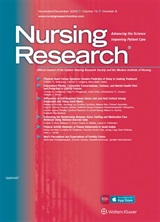
Editor's Note A recent article in HealthLeaders profiles an innovative approach to alleviating nurse burnout—one that the outlet calls “a four-legged answer to nurse wellbeing.” Launched in 2020 at The Ohio State University Wexner Medical Center, the Buckeye Paws program brings certified therapy dogs directly to nursing units, offering nonjudgmental,…

Editor's Note Nearly 140,000 nurses have left the workforce since 2022, and 40% of the remaining workforce plans to exit by 2029, according to the 2024 National Nursing Workforce Study from the National Council of State Boards of Nursing (NCSBN). According to an April 17 announcement from NCSBN, the survey…

The idea that “you can take the nurse out of the OR, but you can’t take the OR out of the nurse” is not new. And yet, a recent panel discussion among emerging nurse leaders indicates this old adage rings truer today than ever. Speaking at the 2024 OR Manager…

Editor's Note A scoping review of 15 studies reveals that the COVID-19 pandemic significantly disrupted oncological abdominal surgery (OAS), leading to postponed or canceled procedures, adoption of alternative treatment plans, and increased psychological stress among surgical teams. Published November 5 in the American Journal of Surgery, the findings emphasize the…

Editor's Note A study analyzing data from the National Database of Nursing Quality Indicators (NDNQI) revealed that nursing-sensitive quality indicators (NSIs) worsened during the COVID-19 pandemic and remain elevated years after the onset of the pandemic, reflecting ongoing challenges in nursing practice. Published in the journal Nursing Research, the findings…

Editor's Note Poor sleep quality in the month leading up to surgery could increase the risk of postoperative delirium, according to research presented at the Anesthesiology 2024 annual meeting, hosted by the American Society of Anesthesiologists (ASA). An October 15 report in NewsWise has the details. According to the article,…

Editor's Note A new meta-analysis of 85 studies reveals a significant association between nurse burnout and negative outcomes in patient safety, satisfaction, and care quality. The findings underscore the impact of burnout—characterized by emotional exhaustion, depersonalization, and low personal accomplishment—on healthcare performance globally, with implications for organizational and policy interventions,…

Editor's Note In honor of World Mental Health Day October 10, the American Nurses Foundation announced a free curriculum for improving nurse support and well-being. The free curriculum is available to all nurses. It includes an overview, a training guide for nurse leaders, an implementation guide, and the complete course,…

Editor's Note Less than half of physicians surveyed by the American Medical Association (AMA) in 2023 reported feeling burned out—the first time the figure has dropped below the 50% mark since 2020. These findings evidence continued decline in burnout from the record-high 62.8% in 2021 and 53% in 2022, according…

Editor's Note Nearly half of hospital executives report that their hospitals are not fully prepared to cope with patient volumes, Becker’s Hospital Review reported June 13. Citing the June 12 Hospital Operations Outlook Survey from FTI Consulting, Becker’s reports that nursing and mental and behavior health specialists represent the greatest…